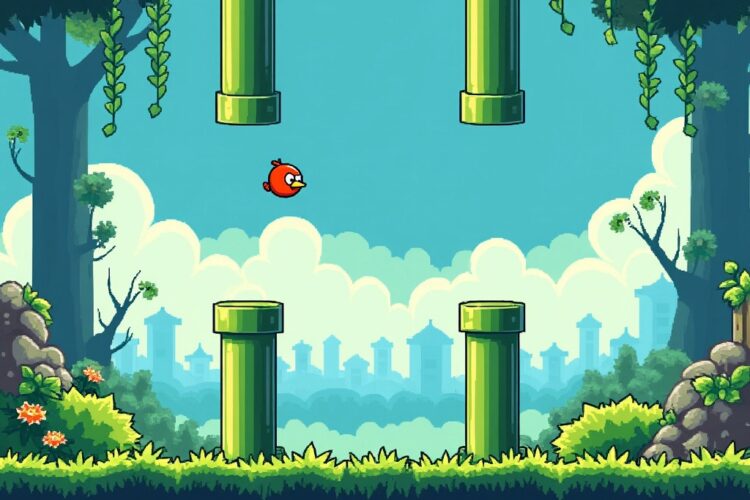Flappy Bird, created by Dong Nguyen, soared in 2014 as a simple yet addictive game where players navigate a bird through pipes. Its viral success, earning $50K/day, led to sudden removal from app stores due to the creator’s stress over fame and criticism. The game’s legacy influenced mobile game design, highlighting the potential for indie success and sparking numerous clones. Its cultural impact remains as a testament to simplicity in game design and the unpredictability of viral trends.
Long Version
The Rise and Fall of Flappy Bird
Flappy Bird, a seemingly simple mobile game, became a cultural phenomenon in 2013-2014, only to vanish abruptly from app stores, leaving behind a legacy filled with intrigue, lessons in game design, and a significant impact on the mobile gaming industry. Here’s an in-depth look into its creation, success, controversy, and legacy.
Creation and Gameplay
Flappy Bird was created by Vietnamese developer Dong Nguyen, under his game development company, .GEARS Studios. The game was released in May 2013 but didn’t gain massive popularity until early 2014. The gameplay was straightforward: players tap the screen to make a bird fly between green pipes without hitting them. The mechanics were simple, yet the game was notoriously difficult, leading to a blend of addiction and frustration.
Virality and Popularity
The game’s surge in popularity can be attributed to several factors:
- Simplicity: Its basic graphics and simple one-tap control made it accessible to everyone.
- Difficulty: The game’s challenging nature spurred players to beat their high scores, share their achievements on social media, and challenge friends.
- Social Media: Word of mouth, memes, and shares on platforms like Twitter and YouTube propelled its visibility.
By January 2014, Flappy Bird was the most downloaded free game in the iOS App Store, reportedly earning Nguyen $50,000 a day from in-app advertisements.
Controversy and Removal
Despite its success, Flappy Bird was not without its controversies:
- Design Concerns: Critics pointed out similarities between Flappy Bird’s pipe graphics and those from Nintendo’s Mario series, raising concerns about intellectual property.
- Addictive Nature: The game was criticized for its addictive quality, which some argued was exploitative.
In February 2014, Dong Nguyen announced via Twitter that he would remove Flappy Bird from app stores, stating, “I cannot take this anymore.” He cited the game’s impact on his simple life as the reason, not legal issues, although the pressure from sudden fame and criticism likely played a part.
Legacy and Impact
- Market for Simple Games: Flappy Bird demonstrated the market’s appetite for simple, hard-to-master games, influencing the design of many subsequent mobile games.
- Indie Developers: It showcased that independent developers could achieve massive success without large budgets or teams.
- Clones and Tributes: Post-removal, the app stores were flooded with clones, each trying to capture the magic of the original. This phenomenon highlighted the game’s significant impact on mobile gaming trends.
- Economic Impact: The game’s brief stint showed how quickly a mobile game could generate revenue, influencing how developers and marketers approached mobile game monetization.
Technical and Design Analysis
- Game Mechanics: The physics of Flappy Bird, where each tap provides a fixed upward force, contributes to its unpredictable flight pattern, making each game session unique.
- Visuals and Sound: The retro-style graphics were not just a design choice but also a statement on the overemphasis on high-end graphics in mobile gaming. The lack of music and minimal sound effects added to its quaint charm but also focused player attention solely on gameplay.
Cultural Impact
Flappy Bird became more than a game; it was a shared experience. It appeared in TV shows, was the subject of countless memes, and even influenced fashion with themed merchandise. Its sudden disappearance only added to its mystique, making it a topic of digital folklore.
Conclusion
Flappy Bird’s story is a compelling case study in the unpredictability of viral success in the digital age, the psychological impacts of game design, and the personal toll of sudden fame. While the game itself was short-lived in the public domain, its ripples are still felt in the mobile gaming industry, reminding developers and players alike of the power of simplicity and the complex relationship between creator, creation, and consumer in the modern era.






